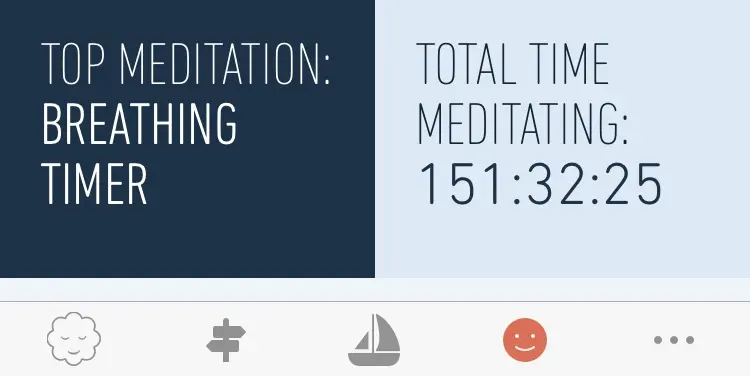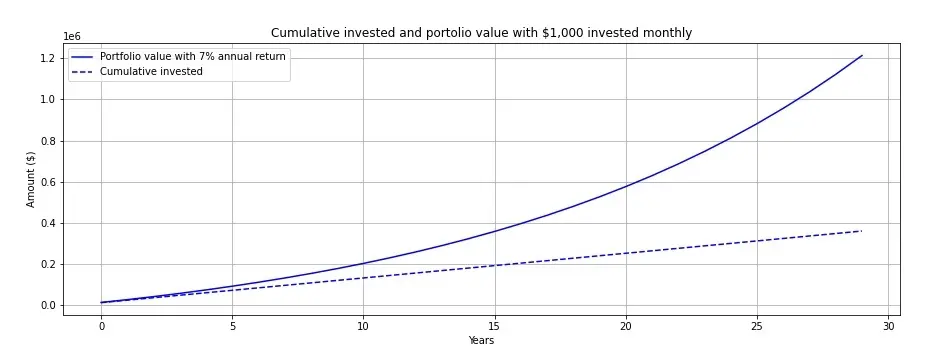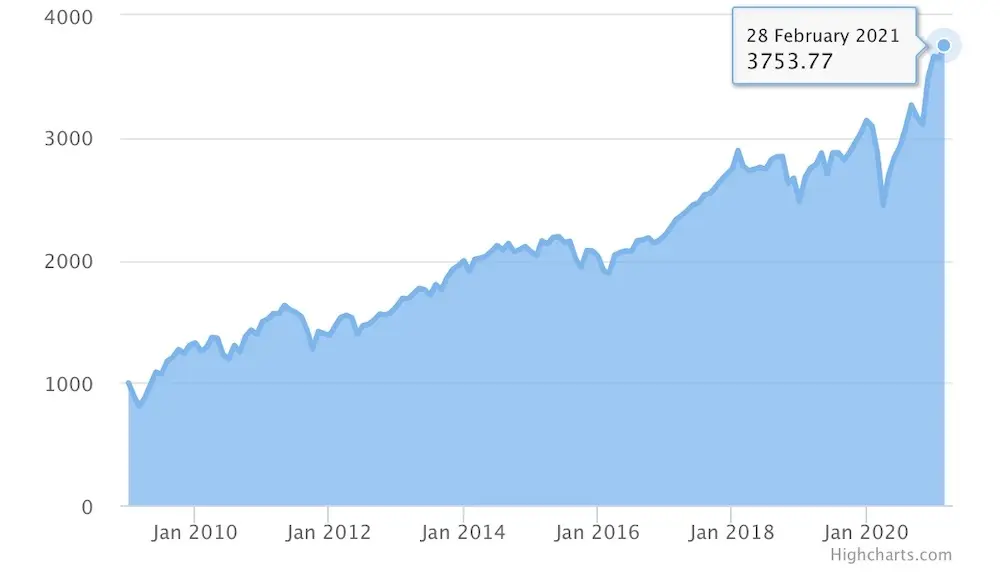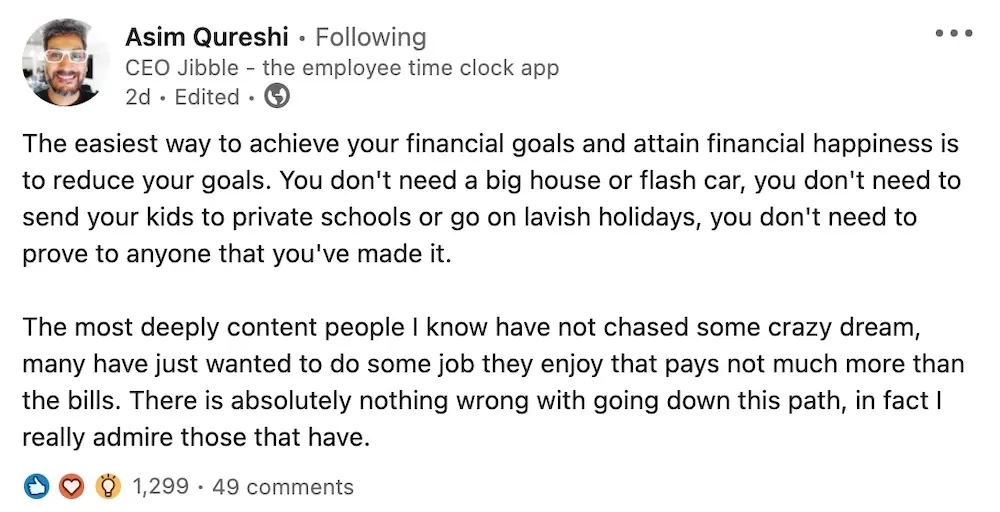Seven Habits that Shaped My Last Decade
Occasionally, I get questions about my habits. Why did I start writing? How has meditating benefited me? How did I start investing? Finally, I decided to write about them in this post.
We are what we repeatedly do. Excellence, then, is not an act, but a habit. - Aristotle (and Will Durant)
As I reflect and write, I realize they had a big impact on my last decade, and I believe you can benefit from them too. In this post, I’ll share seven simple habits, how to pick them up, how much effort they require (hint: minimal), and my progress so far.
Reading
I find it harder to count the number of successful people that don’t read relative to those that do. When I ask someone how they picked up a life skill (e.g., negotiation, difficult conversations), they often refer to a book. Likewise, when people ask me for advice, I usually refer to books that helped on that topic.
Taking machine learning as an analogy, books are like pre-trained models. They contain a lifetime of learning by the authors, condensed into a couple hundred pages. Take the shortcut by using these pre-trained models and fine-tuning them based on your own exploration and experience.
The man who doesn’t read has no advantage over the man who can’t read – Mark Twain
How to pick up this habit? Just read any book that interests you. Fiction, non-fiction, Dan Brown, Cal Newport, anything. Reading is easy. That said, here are two ideas that helped me read—and enjoy reading—more.
First, read a few books at a time. I alternate between a heavy technical book (Effective Python), a lighter non-fiction (How Not To Be Wrong), and a lightest no-thinking-required (Bad Blood). This way, depending on how much energy I have remaining, I always have a book to chew on.
Second, recognize there are tree books and branch books. Tree books lay out a framework. Cedric Chin cites Thinking, Fast and Slow as a behavioral psychology tree book and High Output Management as a management tree book. Branch books build on tree books and usually expound on a single idea with lots of examples. Branch books can be skimmed while tree books might take more time.

Some of the books my wife let me bring to Seattle; mostly reading ebooks now.
I read based on what I need at that time. My bookshelf has clusters on investment, career, machine learning, and programming-related books, mapping out various stages of my life. Looking for recommendations? Here are some great books and what they taught me:
- 7 Habits of Highly Effective People: How to be more
- The Ancient Art of Stoic Joy: How to be happy with less (highly recommended)
- So Good They Can’t Ignore You: Skills > Passion
- Millionaire Teacher, Random Walk Down Wall Street, Bogleheads: How to invest
- Intro To Statistical Learning, Machine Learning: ML fundamentals from the statistical and computer science perspective
- Pragmatic Programmer, Clean Code: How to write code
- Writing Tools, On Writing Well: How to write
- Extreme Ownership, High Output Management: How to lead and manage
- Zero to One, Lean Startup, Innovator’s Dilemma: How to innovate in organizations
- Total Recall, Shoe Dog, Steve Jobs, Elon Musk: Inspiration
How much effort does it take? 10 - 30 minutes a day goes a long way. You’ll feel the benefits within months.
Gratitude
We humans are unhappy because we’re insatiable. After working hard and getting what we want, we lose interest. Rather than being satisfied, we get bored and want grander things.
Psychology refers to this as hedonic adaptation. Lottery winners were observed over a period of time. After winning the lottery and having an initial period of exhilaration, they settled back to their previous levels of happiness. They started taking their new Teslas and penthouses for granted, just like how they felt dissatisfied with their old Hondas and cramped apartments.
It happens in careers too (as I know all too well). We might have once dreamed of a certain job, in a certain company. We study hard and spend years making progress towards it. Once we land our dream job, we’ll be delighted! For a bit. Then we start to aim for the next position. It’s a never-ending treadmill.
One way to get off the dis(satisfaction) treadmill is to practice gratitude—it helps us not take things for granted. The Stoics take this one step further via negative visualization, where they imagine losing the things they value—family, loved ones, career, assets, etc.
How to pick up this habit? At the start of each day, think of three things you’re grateful for and write them down. I started doing this because someone got me a copy of the five-minute journal. Using it led to a perceptible improvement in my mood and I’ve continued the habit since (without the journal).
You can take it a step further by practicing gratitude throughout the day. When something good happens, be grateful and thank whoever led to it. When something bad happens, thank the stars that it didn’t turn out worse.
How much effort does it take? It takes only five minutes at the start of each day to write down three things we’re grateful for.
Meditation
Most of our minds have monkeys and panic monsters. Monkeys are pleasure-seeking (and easily distracted) while panic monsters are… well, panicky.
From an evolutionary perspective, this makes sense. Our ancestors who felt anxious about whether they have enough food were less likely to starve compared to those who were more carefree about their next meal. Cavemen who were constantly on alert for predators were also more likely to survive.
But today, our world is different. We now live in a hyper-connected, always-on world. Emails, messages, and app notifications disrupt our attention dozens of times a day (if we let them). This erodes our ability to concentrate and reduce performance on attention-demanding tasks, even if we don’t respond to them. Now, those monkeys and panic monsters work against us.
All of humanity’s problems stem from man’s inability to sit quietly in a room alone. —Blaise Pascal
I’ve found meditation helpful in reclaiming my peace and ability to focus. It raises my awareness of monkey and panic monster thoughts. This lets me choose how (not) to let those thoughts affect me, and reduces the extent of unconsciously reacting to them. As a result, I feel more calm and able to focus.
How to pick up this habit? I stumbled upon this meditation app (while taking The Science of Happiness on EdX) and have been using it since. It has many free meditations and makes it easy to start meditating 5 - 10 minutes a day.
In the beginning, I started each day with five minutes of mindful meditation. Over time, I’ve lengthened it to 10 minutes, and then 20. Meditation is exercise for the mind—it gets easier the more your practice it.

800+ days of 5, 10, and 60-minute meditations, give or take a dozen.
I also found Naval’s Almanack and The Book of Joy helpful in learning about meditation.
My attempts at hour-long meditation
I’ve been trying to meditate for hour-long sessions over the years. But I was never able to sustain it beyond a week because I couldn’t feel the benefits of it (over a 20-minute session).
However, something changed during my 2020 winter break. I had a two-week period where I had nothing on my schedule. No work, no writing, no learning, no gaming, no worries. When I tried meditating for an hour this time, something clicked. I think that having nothing to rush to allow me to fully devote my mind to meditation.
In these hour-long meditations, for some reason, I began practicing reflective meditation. I would reflect on how my year has been, dig into why something was bugging me, and contemplate how I can learn and grow. The hours spent unraveling these mind knots have been life-changing, and I’ve continued with hour-long meditation every since.
How much effort does it take? 5 - 10 minutes at the start of each day. Another session during lunch also helps with regaining focus to tackle the second half of the day.
Energy Management
What’s the difference between a top 10 tennis player and a top 100 tennis player? Tony Schwartz and Jim Loehr found that top 10 players optimized for rest between each point. They were able to lower their heart rates by up to 20 beats per minute in the 15 - 20 seconds between each point, given them an edge in later sets of the game.
Our energy levels also differ throughout the day. We each have periods when our energy is highest—that’s when we do our best work. For me, that’s between 0600 - 1500. Before realizing this, I tried to cram workouts and studying after work. It took too long for me to realize that it was unproductive.
How to pick up this habit? Schedule breaks into your day. Take a 10-minute break after every 60 - 90 minutes of deep work (unless you’re in flow). Build in breaks into meetings. Instead of 1-hour meetings, schedule for 50 minutes; instead of 30-minute meetings, schedule for 25. This gives people time between meetings to stretch and have bathroom breaks, more pertinent now that we work from home. Taking regular breaks lets you recharge and get more done in a day, relative to non-stop work.
Structure your day around your energy levels. If you’re a maker, set aside time when your energy is highest for deep work. I block out 0900 - 1200 and try to only schedule meetings after 1500. If making decisions in meetings is your most important task, start your day with those meetings like Jeff Bezos.
How much effort does it take? At the start, you might need to be deliberate about scheduling breaks and adjusting your calendar. After the initial-ramp up, it shouldn’t take more than 5 minutes of additional planning a day.
Exercising
I shouldn’t need to spell out the benefits of exercise, right? In case you’re unacquainted with exercise, it helps you feel better, sleep better, gives you more energy, lift heavy stuff, and not get winded after running for the bus or climbing flights of stairs. Oh, it also helps you look better—my main reason for going to the gym when I was single.
How to pick up this habit? Start with exercising at home. I used this 7-minute workout app when I lost access to the gym. It’s by Johnson & Johnson, the original creator of the 12 exercises that became the 7-Minute workout fitness craze. If that’s too easy, consider Shawn T’s insanity workout. My wife and I started doing this a while back and I still can’t get through a full 30-minute workout.
If your aim is to get stronger and build muscle, StrongLifts 5x5 is great for beginners. It consists of simple exercises like squats, deadlines, and bench presses. Julian also has a well-researched guide on building muscle that covers preparation, diet, and workout plans.
Last, don’t neglect cardio. Have 1 - 2 sessions of cardio each week. Jogging or HIIT works.
Rule #1: Cardio - When the virus struck, for obvious reasons, the first ones to go were the fatties. — Zombieland
How much effort does it take? 30 - 60 minutes a day, 3 - 5 days a week. It might seem like a lot of time, but in my experience, the gains in fitness, health, energy, and better sleep more than make up for it.
Writing (and Speaking)
A few years ago, some mentors advised me to practice my communication skills. As a result, I started writing once a month, and now, once a week. After more than 100 posts and talks, I can say that writing helps me:
- Clarify and organize my thinking as I try to put thoughts on paper (or markdown)
- Expose and fill gaps in my knowledge as I struggle to write technical posts
- Share my knowledge and experience at scale via the magic of the internet
- Bat-signal my interests, attract likeminded people, and make new friends
- Save time by answering frequently asked questions via publishing online
How to pick up this habit? Start by writing about whatever interests you. And start small with 200 - 500 word posts. Consider this as warmup for your writing muscles. I’ve written a few short posts that took a few hours each.
Some people ask: Don’t I need to identify my topics? Don’t I need to find my audience? Maybe. But honestly, no one’s going to read your first n pieces except family and friends, and even then, you have to send them a link and ask for feedback. So start with writing for yourself. Think of it as practice and discovering your interests. I started writing about my side projects and OMCSC classes and 105 posts in, I’m still figuring it out.
I’ve written (far too much) about writing and will refer you to a few of the better pieces:
- An easier way to write: reading, note-taking, writing
- What school should have taught us about writing
- The importance of writing in a tech career
14 Ideas on How to Grow Your Business by Writing (THREAD)
— Eugene Yan (@eugeneyan) May 3, 2020
Ideas are all from @shl and @david_perell
Notes below 👇https://t.co/c3Q45CZtdP
How much effort does it take? A couple hours weekly.
Writing is not just about writing
A big chunk of the effort starts before writing. It starts when you read, have experiences and discussions with others, form opinions, and ponder about things.
For example, Julian (a writer I respect greatly) recently wrote his first post in over a year. He shared that the post took 22 hours to write, but seven months to figure out what to write about.
Stats for anyone curious:
— Julian Shapiro (@Julian) February 26, 2021
• Total writing time: 22 hours
• Months taken to figure out what to say: 7*
• Drafts needed: 4
• Highest word count: 2800
• Final word count: 2100
* I always loved this topic but lacked anything interesting to say on it until this month.
Similarly, Cedric (another writer I’m a fan of) shares that some questions he investigates can take years before becoming a piece of writing.
*whispers* sometimes I ask the questions years in advance.
— Cedric Chin (@ejames_c) March 4, 2021
If you’re just starting to write, I hope this doesn’t discourage you—Julian and Cedric set a high bar for writing. Mere mortals (like myself) can’t even hope to write half as well as them.
Investing

Portfolio value from investing $1,000 monthly for 30 years with 7% annual return
If you invested $1,000 monthly (i.e., $12k a year), you would have invested $360k over 30 years. Assuming a 7% return—Vanguard Total World (VT) had an annualized return of 11.5% since January 2009—this would grow to slightly more than $1.2 million (3x of what you invested). (Note: This doesn’t account for expense ratio; more about this in a bit).

$1,000 invested in $VT on Jan 2009 is now worth $3,754, 11.5% annualized return (source)
Need I say more? This is your money making more money for you, with little to no work.
How to pick up this habit? I think the best approach is by reading good books. Here are a few I recommend.
Millionaire Teacher: Great for beginners. Teaches the fundamentals of diversification, keeping costs low (i.e., expense ratio), time in the market vs. timing the market, etc. Can be finished in under 4 hours. I have three copies that I just loan to family and friends who are just getting started.
Random Walk Down Walk Street: A great history lesson on past bubbles (tulip mania, south sea bubble, internet bubble). Teaches that what’s happening now has happened before (cryptocurrency? NFTs?) Also discusses technical vs. fundamental analysis, market and investment theory, etc.
Irrational Exuberance: Dives into explanations (e.g., structural, cultural, psychological) for what goes on in the market. Demonstrates that it’s very hard to explain—much less prove—market movements and causality, even in hindsight. For example, many thought COVID would lead to a downturn in 2021 but it turned out to be a bull year.
Bogleheads: Jack Bogle is the founder of Vanguard Investments, a provider of low-cost index funds (all my ETFs are with Vanguard). Contains simple, practical advice for long-term investing and wealth creation distilled from the Bogleheads forum. A more in-depth version of Millionaire Teacher.
Intelligent Investor: The book on value investing from Benjamin Graham, the man who taught Warren Buffet. Includes heuristics to identify cheap companies (e.g., trailing P/E ratio, historical growth, etc.) Easy to read, difficult to apply successfully.
To achieve satisfactory investment results is easier than most people realize; to achieve superior results is harder than it looks. — Benjamin Graham
As a final point, I recommend familiarizing yourself with your investment vehicle’s expense ratio, usually charged on a percentage of your assets (e.g., 0.1% - 2%). The expense ratio covers the fund’s operating expense. I think expense ratio is key to your overall return—a 1.25% expense ratio will reduce your returns by 1/4 over 30 years!
You can try out different investment amounts (Column C) and returns and expense ratios (Row 3) in this Google Sheet.
How much effort does it take? If you’re starting from scratch, it’ll probably take 20 - 40 hours of reading and learning, and setting up brokerage accounts. After that, it’ll take 5 - 10 minutes monthly if you’re just dollar cost averaging—it’s worked well for me so far.

One year and total return of my portfolio and Vanguard Total World (VT)
Conclusion
Looking back, I wished I started these habits earlier. Every one of them has improved my life considerably, and several have compounding effects (e.g., reading, writing, investing).
Are there any habits that you benefited from that I should try? Let me know @eugeneyan!
Seven habits had an outsized impact on my last decade.
— Eugene Yan (@eugeneyan) March 17, 2021
A summary thread 👇https://t.co/apYXV81550
Thanks to Yang Xinyi for reading drafts of this.
If you found this useful, please cite this write-up as:
Yan, Ziyou. (Mar 2021). Seven Habits that Shaped My Last Decade. eugeneyan.com. https://eugeneyan.com/writing/seven-habits-that-shaped-my-decade/.
or
@article{yan2021habit,
title = {Seven Habits that Shaped My Last Decade},
author = {Yan, Ziyou},
journal = {eugeneyan.com},
year = {2021},
month = {Mar},
url = {https://eugeneyan.com/writing/seven-habits-that-shaped-my-decade/}
}Share on:
Browse related tags: [ life misc ] or
Join 11,800+ readers getting updates on machine learning, RecSys, LLMs, and engineering.
